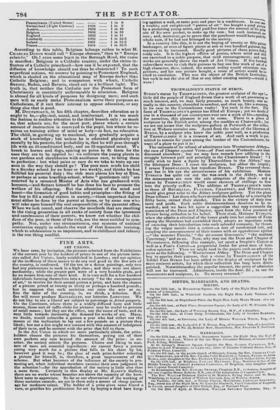FINE ARTS.
ART UNIONS.
We have seen, by invitation, the pictures selected from the Exhibitions of the current year by the holders of prizes in one of the picture lotte- ries called Art Unions, lately established in London ; and our opinion of the inefficacy of these means to do any real good to the fine arts of the country, is confirmed. Of the ten or a dozen paintings, only two had any pretensions to rank in a high class ; and they were not above mediocrity ; while the greater part were of a very humble grade, and by no means first-rate of their kind. It is very well for a few hundred individuals forming themselves into a society " for the encouragement of art," to receive for their annual guinea a print, and have the chance of a picture priced at twenty or thirty or perhaps a hundred pounds; but to suppose that such societies can raise the arts or re- fine the taste of the country, is, we think, a delusion. Raf- fles will never produce RAFFAELLES, nor lotteries LORENZOS. We do not like to see a liberal art subject to patronage ire forma pauperis. On the Continent, where there is a widely-diffused taste and little money, these sort of raffle-clubs for pictures may be useful to persons of small means ; but they are the effect, not the cause of taste, and do very little towards increasing the demand for works of art. Many, no doubt, would subscribe a guinea a year who had either not the means or the inclination to lay out a few pounds on a picture they liked; but not a few might rest content with this amount of indulgence of their ta.te, and be content with the prize that fell to them.
In the Art Union to which we more particularly allude, the prize. holders choose the pictures for themselves, paying out of tbeir own pockets any sum beyond the amount of the prize : in an- other, the society selects the pictures. Choice and liking in mat- ters of taste are essential ingredients : we cannot fancy a person caring very much for a picture that falls to his share by lot, however good it may be ; the plan of each prize-holder selecting
a picture for himself, is, therefore, a great improvement of the
scheme. But what becomes of the influence of the society in pro- moting art, when individual members exercise their own judgment in the selection?—for the approbation of the society is little else than
a mere form. Certainly in this display at Mr. flaiNv's Gallery,
there are no works whose beauties are above the capacity of the hum- blest taste to appreciate. So far as our observation of the working of these societies extends, we see in them only a means of cheap patron. age for mediocre talent. The holder of a prize gives some friend a turn, or gratifies his predilection for art by buying a dead hare hang-
ing against a wall, or some pots and pans in a wasbhouse. In one cost a wealthy and enlightened "patron of art" has bought a good pious by a promising young artist, and paid five times the amount of his priz4 out of his own pocket, to make up the sum : but such instances ate rare; and, moreover, go to prove that the purchaser would have paid the whole sum, if he had not belonged to the society. In a country like this, it is not the buying of twenty or fifty guinea landscapes, or even of figure pieces at one or two hundred guineas,611; requires to be increased. Really good pictures of these prices find ready sale. It is the highest efforts of genius, where mind and skin are exercised to a noble purpose, that need encouragement ; and such works are generally above the reach of Art Unions. If five hundred subscribers were to club their guineas to buy one fine work of art of s high character, then, indeed, the annual outlay would stimulate cers, petitors; and for one picture bought, a score of artists would be is- cited to emulation. This was the object of the British Institution. but such is not the aim of that or any other existing society—would it were !


























 Previous page
Previous page